 Petzlover
Petzlover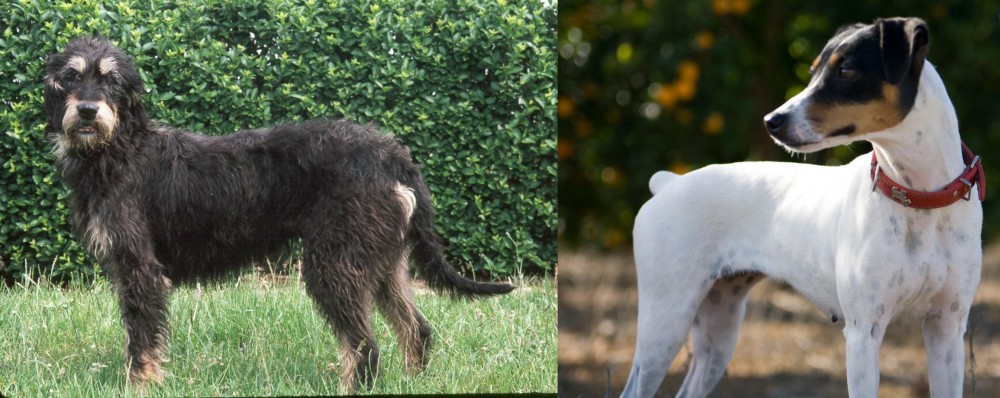 Griffon Nivernais is originated from France but Ratonero Bodeguero Andaluz is originated from Spain. Griffon Nivernais may grow 19 cm / 8 inches higher than Ratonero Bodeguero Andaluz. Griffon Nivernais may weigh 16 kg / 36 pounds more than Ratonero Bodeguero Andaluz. Griffon Nivernais may live 4 years less than Ratonero Bodeguero Andaluz. Both Griffon Nivernais and Ratonero Bodeguero Andaluz has almost same litter size. Griffon Nivernais requires Moderate Maintenance. But Ratonero Bodeguero Andaluz requires Low Maintenance
Griffon Nivernais is originated from France but Ratonero Bodeguero Andaluz is originated from Spain. Griffon Nivernais may grow 19 cm / 8 inches higher than Ratonero Bodeguero Andaluz. Griffon Nivernais may weigh 16 kg / 36 pounds more than Ratonero Bodeguero Andaluz. Griffon Nivernais may live 4 years less than Ratonero Bodeguero Andaluz. Both Griffon Nivernais and Ratonero Bodeguero Andaluz has almost same litter size. Griffon Nivernais requires Moderate Maintenance. But Ratonero Bodeguero Andaluz requires Low Maintenance
 The Griffon Nivernais is a working breed dog originating in France and used as a hunting dog because of his exceptional scent skills and his alertness with hunting.
The Griffon Nivernais is a working breed dog originating in France and used as a hunting dog because of his exceptional scent skills and his alertness with hunting.
The idea was to develop a dog that looked much like the hunting dogs of the Middle Ages. French noblemen kept these dogs but the breed disappeared somewhat after the French Revolution, being restored again in 1925.
The restoration of the breed was done based on the Grand Griffon Vendeen but other breeds were also used such as the Otter- and Foxhounds. The breed has yet to receive official recognition by the AKC but it is recognized by both the FCI and the UKC.
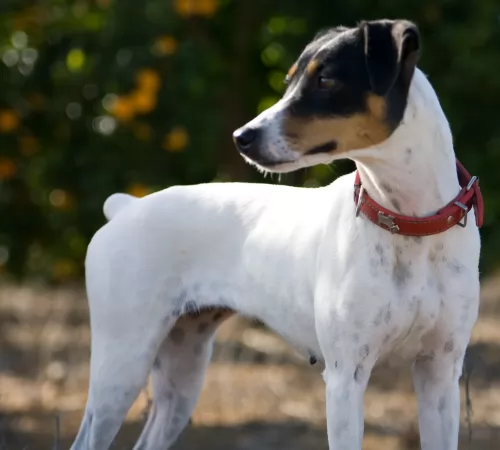 Long ago the English visited Spain to sample their wines, bringing with them smooth coated English Fox Terriers which were later crossed with other dog breeds of the area.
Long ago the English visited Spain to sample their wines, bringing with them smooth coated English Fox Terriers which were later crossed with other dog breeds of the area.
It is believed that the Andalusia Ratter’s ancestors were smooth coated fox terriers. The Club Nacional del Perro Andaluz Ratonero Bodeguero was established and in 1993 a standard for the breed was set.
It is only fairly recently that the breed was recognized by the Royal Canine Society of Spain but it isn’t recognized by any of the major kennel clubs.
 As a medium sized dog, the Griffon Nivernais stands at 55 to 62cm in height and weighs between about 22 and 25kg.
As a medium sized dog, the Griffon Nivernais stands at 55 to 62cm in height and weighs between about 22 and 25kg.
He is recognized easily by his distinctive rough or shaggy coat which is a grey with fawn around the muzzle and legs. Other colors can be black and fawn. Sometimes this blend of colors gives him a grizzled look in appearance.
He is also noted for the hairy eyebrows, a beard and mustache. He has dark brown eyes, black nose, long floppy ears and a tail that is held upright and with a slight curve. He is a muscular dog with a deep chest and a slight arch in the back.
Stubborn, courageous and independent, the Griffon Nivernais is a hunting dog with amazing scenting abilities. He is a dog used to working in a pack with other dogs so he tolerates other dogs well. He is a friendly dog, getting on well with children as well.
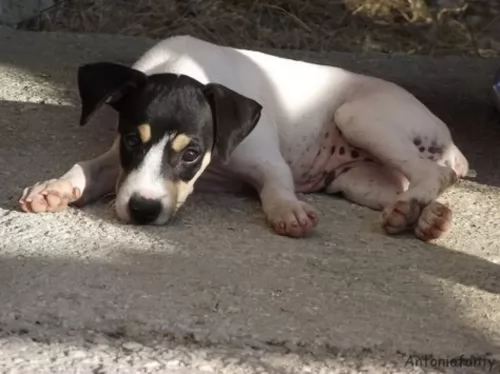 Also known as the Spanish Jack Russell, the Ratonero Bodeguero Andaluz looks very similar to this popular Jack Russell Terrier.
Also known as the Spanish Jack Russell, the Ratonero Bodeguero Andaluz looks very similar to this popular Jack Russell Terrier.
He is a small to medium sized dog with a lean, muscular body. The Ratonero developed in the south of Spain and is thought to be a mix of local ratting dogs and Fox Terriers. This ensured a quick, agile hunter.
The dog stands at between 35 – 43cm in height and weighs 6 - 9kg. The dog’s head is fairly small with dark brown eyes and half erect-half floppy ears. The coat is mainly white with some freckling. It is short and smooth with shades of black and tan covering the facial area. Some of these dogs are born with a natural bob-tail.
These dogs are known to have robust, hearty, happy personalities, full of the joys of living. They get on well with children as well as other pets if they have grown up with them.
Introductions should be slow if one of these dogs are brought into a home where there are already other pets. He is a very active breed and will be requiring plenty of mental stimulation and physical exercise.
They can provide quite a bit of entertainment for their human families as they can become quite clownish. They’re the kind of dogs that can adapt to life in the countryside or the city.
 Your Griffon Nivernais is a sociable, stubborn, independent dog who loves to be around his human family members.
Your Griffon Nivernais is a sociable, stubborn, independent dog who loves to be around his human family members.
Socialization and training will do him good and round him off, making him obedient and responsive to your commands. He isn't an aggressive dog, but is even tempered and confident.
Exercise him well, feed him quality food, give him a nice warm, dry place to sleep, just like any other family member of yours, and you'll be rewarded with the companionship of a faithful, loving friend.
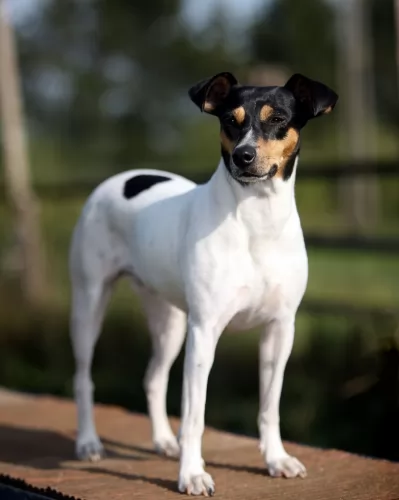 Your Ratonero Bodeguero Andaluz to this day is a ratter, always alert and ready to spring on prey. He is always lively and friendly, and with his loving nature, makes a splendid companion for his human family.
Your Ratonero Bodeguero Andaluz to this day is a ratter, always alert and ready to spring on prey. He is always lively and friendly, and with his loving nature, makes a splendid companion for his human family.
He is also a stubborn dog, liking to go his own way, and therefore will require training and socialization. He is an adaptable little dog too and when you bring him into your home he is willing to adapt to your way of life and become a loyal and loving member of your family.
 The typical lifespan for your Griffon Nivernais is 10 to 14 years. Even though you're highly unlikely to spend much time with him at the vet, there are one or two common dog illnesses worth knowing about -
The typical lifespan for your Griffon Nivernais is 10 to 14 years. Even though you're highly unlikely to spend much time with him at the vet, there are one or two common dog illnesses worth knowing about -
It is the fate of many dogs with floppy ears that they are prone to developing ear infections. You may notice him shaking his head canine, his ears may be red and there could even be a discharge.Get him to the vet as ear infections can be promptly treated with a course of medication.
Remember to have your Griffon Nivernais puppy vaccinated at 6 weeks of age. Puppies are vulnerable to horrible diseases which can sap the very life from them. These diseases are distemper, canine hepatitis, parvovirus as well as rabies. The puppy’s first vaccinations should be at 6 weeks of age followed by a second vaccination 2 to 4 weeks later.
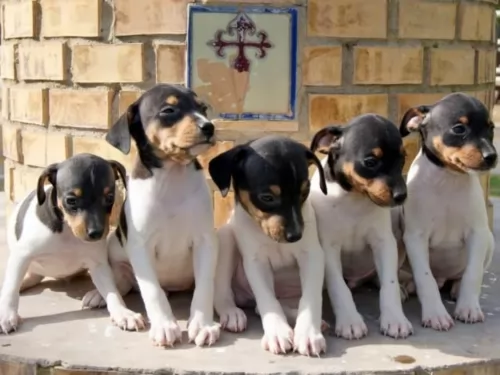 With good care, your Andalusian Ratter isn’t likely to get sick, but still, you would be better off knowing about some of the common dog diseases your pet could get.
With good care, your Andalusian Ratter isn’t likely to get sick, but still, you would be better off knowing about some of the common dog diseases your pet could get.
This is usually seen in young dogs where there is lameness in the hind legs and hip pain. It is believed that Legge Perthe’s occurs because of a genetic predisposition, and when it develops, there is sadly no cure.
Skin infections may seem fairly mild but nothing can be further from the truth. They can be painful and frustrating. Skin redness, dryness, itchiness and pain can cause your pet to lick and bite and make the situation worse. If your pet is being driven crazy by a skin irritation, get him to the vet who will do a complete physical examination.
Other diseases to be aware of include hip dysplasia, obesity, epilepsy and bloat.
 This breed needs to be walked daily, and he needs a large space to run and play. Take him on walks, to the park, or give him a good game with ropes and balls.
This breed needs to be walked daily, and he needs a large space to run and play. Take him on walks, to the park, or give him a good game with ropes and balls.
In spite of his long, shaggy coat, the Griffon Nevernais doesn't need any special grooming and his shaggy coat will require brushing twice a week to remove loose hairs. When you brush him, you can also check for fleas and ticks.You get special flea combs for this. You can speak to your vet about recommendations too.
Because his coat is of a harsh texture it doesn't tangle or matt. Bathing will only be necessary when he becomes super dirty as too much bathing removes natural oils. He will need to have his nails trimmed if they don't wear down naturally, and he will also need to have his ears cleaned to keep them free of wax and dirt and to prevent ear infections.
Brush his teeth 2 or 3 times a week will also help towards preventing dental disease.
He is a high energy dog so he will need to get top quality food. You can feed him the best commercially manufactured food but its to his advantage to include some home-made food too such as cooked chicken, brown rice and vegetables. He'll also need some raw meat from time to time and a constant supply of fresh, cool water.
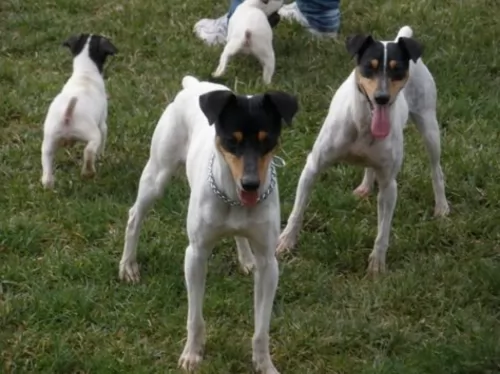 This is a fairly low maintenance dog as the short smooth coat will be easy to brush twice a week.
This is a fairly low maintenance dog as the short smooth coat will be easy to brush twice a week.
Check him over for unusual lumps, trim his nails and check inside his ears, look into his eyes to ensure they are bright and alert and look inside his mouth to make sure he doesn’t have any rotten teeth.
Have your pet neutered or spayed if you want to avoid puppies. This can be beneficial for your pet’s health too.
Feed your Ratonero Bodeguero Andaluz only the best food there is. If you opt for commercially manufactured food, make sure its full of vitamins and minerals. Your little pet will want consistency and simplicity with his food to avoid digestive problems.
Try and provide him with some home-made food which can be added to the dry kibble twice a week as a treat. Boiled chicken, brown rice or pasta and spinach, sweet potatoes and carrots all chopped up ad mixed into the dry kibble will ensure your pet’s health.
Some raw meat added in occasionally will also go towards ensuring his good health.
Always make sure he has access to fresh, cool water.
Provide him with a safe, dry, warm, comfortable place to sleep.
Get him to the vet when you see he is sick.
Ensure he has sun and shade in the garden.
Never ever leave him in a hot car.